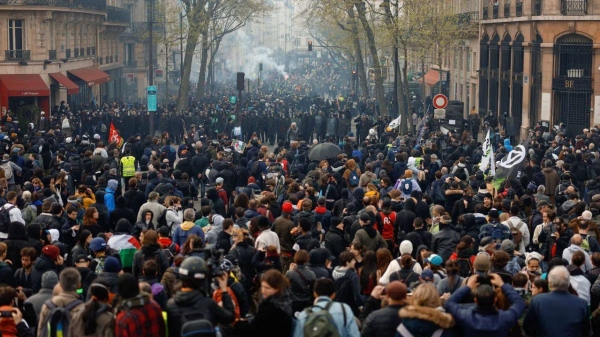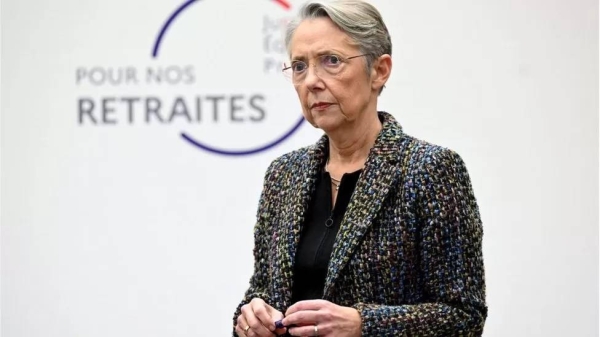
France’s highest constitutional court has approved Emmanuel Macron’s proposals to raise the minimum pension age from 62 to 64.
The ruling means the government can pass the French president’s unpopular plans to increase the minimum eligible pension age as early as next week, to be in force by the end of this year.
The government had hoped the ruling would put an end to three months of protests, but police were on high alert for more demonstrations on Friday night. Hundreds of demonstrators marched from Paris city hall through the Marais area, with several bins set alight and firefighters tackling blazes.
A fire was started in the entrance of a police station in the Brittany city of Rennes and blazed until it was put out by officers. The interior minister Gérald Darmanin tweeted that it was “unacceptable”.
The constitutional council, which was asked by the prime minister, Élisabeth Borne, to examine whether the pension proposals were in line with the constitution, struck down some lesser elements. These included measures designed to increase employment for older workers, which were rejected on the grounds that they did not belong in legislation that was tacked on to a social security budget bill.
Macron now has two weeks to enact the law.
Borne tweeted that there was “no winner, or loser” and that the law had reached the end of its democratic process.
Mathilde Panot of the radical left party La France Insoumise said the left was “more mobilised than ever” to stop the law. The Socialist party politician Olivier Faure said it was a “bad, unjust and illegitimate law”.
Jordan Bardella, of Marine Le Pen’s far-right National Rally party, said the pensions row had shown the “vast gap” between Macron and the people.
After three months of protests, some of them violent, and clashes with police, the political crisis is not yet over. Trade unions and opposition politicians continued to urge the government to shelve the increase in the pension age to 64, with polls showing two-thirds of the French public oppose the measure.
Macron implied earlier in the day on a visit to Notre Dame that he was not someone to back down against street protests. “Stay the course, that’s my motto,” he said.
In Paris, armed riot police were on standby near the heavily guarded building of the constitutional council. All street demonstrations were banned from the area and some metro stations closed. Special three-metre-high security screens were put in place. Police were expecting up to 10,000 protesters in the capital after the ruling, a source told Agence France-Presse. Hundreds of students and high-school pupils gathered to protest near Paris’s Gare Saint-Lazare in the early afternoon.
Trade unionists and protesters gathered near Paris city hall as the ruling was announced.
The constitutional council rejected a request by opposition politicians for a form of citizens’ referendum on the pensions law. This would have been a long and complex process, starting with gathering signatures of least 10% of the electorate, at least 4.88 million voters in the course of nine months. Another request for a referendum has been made, with a decision expected at the start of May.
Macron could make a televised address in the coming days. Having repeatedly dismissed calls for talks with union leaders in recent weeks, he has said he would invite labour representatives for discussions next week, but they want him first to scrap the legislation.
It is uncertain how Macron will address the crisis of confidence in politics. Last month, when the government used an executive order to bypass parliament and push through the pension plan without a vote, it illustrated how difficult it was for Macron’s centrists to govern, after losing their absolute majority in parliament in June. Polls have shown more than 60% of French people support the protests, a figure that has grown in the past three months.
The demonstrations have focused a sense of widespread anger against Macron himself, with protesters saying he is cut off from their real concerns and they want to protect France’s broader social welfare system and public services. Politicians on the left said the pensions plan was unfair to women and to workers in manual jobs, who begin their working lives earlier than university graduates. The government argues that raising the minimum eligible age for a state pension is necessary to keep the pensions system afloat as the population ages.
When the government used an executive order to push through the pension changes without a parliament vote last month, protests increased and demonstrators, including many students, said they were angry at a political system that did not listen to concerns on the street. Lawyers complained policing of the protests was heavy handed.
The CFDT union leader, Laurent Berger, had said that if the bill was only partially approved, it should be re-examined in parliament.
Éric Woerth, a senior member of Macron’s party, said that even though the core part of the law was approved “we have not convinced people”. He told Europe 1 radio: “Once the volcano has cooled down and people look at things with a bit more distance, maybe in the back of their minds they’ll say, ‘Maybe they were right’ … The French pension system needed unpopular decisions to conserve it.”












